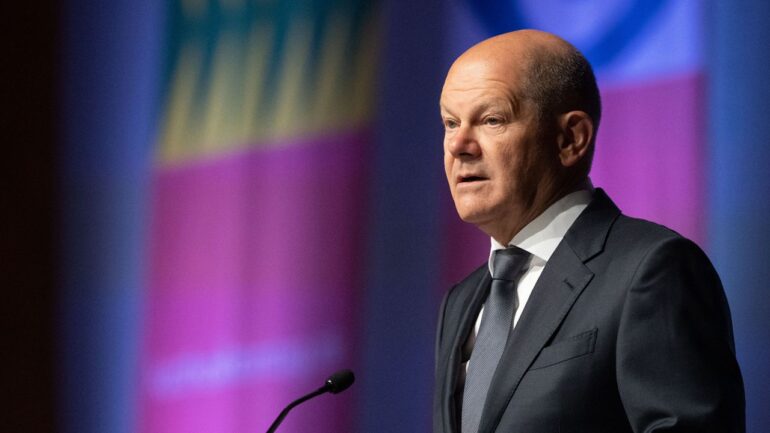TL;DR:
- German Chancellor Olaf Scholz is considering declining his invitation to the UK’s AI summit.
- The summit, set for November 1st, aims to address AI safety, particularly concerning cybersecurity.
- It’s unclear if top tech and political leaders will attend, raising concerns about participation.
- The event will bring together tech companies, academics, and government representatives.
- Bletchley Park, a historic location, will host the summit.
- Germany may avoid overlap with G7 efforts on AI regulation.
- China’s participation sparks controversy due to previous security disputes.
- The US will be represented by Vice-President Kamala Harris.
- The UK seeks to integrate AI regulation into existing bodies.
- Experts call for an international AI regulator.
Main AI News:
In an exclusive development, it has come to our attention that German Chancellor Olaf Scholz is deliberating whether to accept his invitation to the forthcoming high-profile UK summit on artificial intelligence. The event, scheduled for November 1st, is poised to bring together tech luminaries, academic thought leaders, and political heavyweights to deliberate on the pressing matter of AI safety.
The summit’s primary focus revolves around identifying and mitigating potential future threats stemming from the rapidly evolving AI landscape, with particular emphasis on areas like cybersecurity. Notably, Britain has floated the idea of establishing a global AI watchdog tasked with monitoring AI advancements and their associated risks.
While an official guest list remains undisclosed, some insiders from the tech sector express uncertainty about whether the event will draw top-tier leaders. A government source, however, remains resolute, affirming that the summit has garnered significant attention both domestically and on the global stage.
This two-day affair will commence with a gathering of tech companies and academia, convened under the guidance of Michelle Donelan, the Secretary of State for Science, Innovation, and Technology. The following day is set to host an exclusive session, with a select group, including international government dignitaries, engaging in discussions overseen by Prime Minister Rishi Sunak.
The historic Bletchley Park, once the clandestine hub of World War Two codebreakers, will serve as the backdrop for this pivotal summit. While a final decision from Chancellor Scholz is yet to materialize, current indications suggest his attendance is unlikely, sparking concerns about a potential “domino effect” among other world leaders, including French President Emmanuel Macron.
Government sources affirm the participation of heads of state who have conveyed their intent to attend, and our sources indicate high-level representatives from numerous US-based tech giants are expected to be present. Additionally, despite controversies, a Chinese representative has been extended an invitation, though the response remains unknown.
Within the UK’s ruling Conservative Party, opinions diverge on whether China should be excluded from the conference due to previous security disputes. China boasts a substantial AI sector and has already implemented its set of regulations governing responsible AI use within its borders.
The United States, a pivotal player in the AI landscape and the world’s largest economy, will be represented by Vice-President Kamala Harris. The UK, in a strategic move, unveiled the AI summit during Prime Minister Rishi Sunak’s diplomatic mission to the US in June, positioning itself as a key mediator in the global discourse surrounding AI’s potential perils.
However, Berlin appears to be cautious about any potential overlaps with the G7’s efforts, as the group of leading democratic nations has concurred on creating an international code of conduct. Germany, the largest economy in the European Union, is also in the process of finalizing its landmark AI Act by year’s end. This legislation includes a tiered system for AI tools, with varying degrees of regulation based on their significance.
While the European Commission President, Ursula von der Leyen, is expected to grace the upcoming summit, Berlin may opt to dispatch a senior government figure, possibly Vice Chancellor Robert Habeck.
The UK, meanwhile, intends to integrate AI regulation into existing bodies, such as the Equalities Commission, where individuals can lodge complaints if they believe they have faced discrimination due to an AI tool. Nevertheless, many experts advocate for the establishment of an international, UN-style regulator to oversee AI on a global scale.
A source from the Department for Science, Innovation, and Technology noted, “This is the first time an international summit has focused on frontier AI risks and it is garnering a lot of attention at home and overseas. It is usual not to confirm senior attendance at major international events until nearer the time for security reasons.”
Conclusion:
Olaf Scholz’s potential absence from the UK AI summit underscores uncertainty about its global leadership attendance. The summit’s success hinges on attracting top figures from tech and politics, as it grapples with critical AI safety issues. Furthermore, the international AI landscape is in flux, with nations and regions diverging in their approaches to regulation and governance. This uncertainty highlights the need for a unified international framework for overseeing AI technologies, as suggested by experts.

